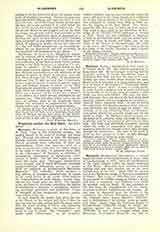

Blemmida (BLEMMYDES) NICEPHORUS, a learned monk and writer of the Greek Church, b. about 1198, at Constantinople; d. 1272. After the establishment of the Latin Empire (1204) his family emigrated to Asia Minor. Blemmida there received a careful training and was soon reputed one of the most learned men of his time. About 1223 he became one of the Byzantine clergy, at that time established in Nica. But owing to difficulties and jealousies he renounced all worldly prospects, became a monk, and built a monastery near Ephesus, over which he presided until his death. In this condition he felt free from all entanglements and on various occasions exhibited independence and courage. At one time he dismissed from the church of his monastery the Princess Marcesina, a mistress of the Emperor John Ducas Batatzes (1222-54), and in justification of his conduct wrote an encyclical letter. Again, when the Patriarch Joseph of Constantinople (1268-75) sought to obtain recognition against the former Patriarch Arsenius (1255-66), he met with a straight refusal from Blemmida. Nevertheless Blemmida was held in high esteem by the contemporary Greek Emperors. The aforementioned John Ducas, far from venting his wrath on him, accepted the rebuke as well merited. When the Patriarchal See of Constantinople fell vacant, in 1255, it was offered to Blemmida by Emperor Theodore II, Lascaris (1254-58); but he preferred his quiet monastic life.
The reputation of Blemmida was really due to his vast learning. Many a Greek youth of high estate learned from him the beauty of letters, or the secrets of philosophy and theology. Among his pupils were the learned Georgius Acropolites and the royal prince, afterwards emperor, Theodore II, Lascaris. Blemmida was the author of several poems, of letters, of a work on the duties of an emperor, of two autobiographies, of two geographical works, of philosophical writings on logic and physics, and of a rule of life for his monks. Among his theological works may be mentioned a commentary on the Psalms, a discourse on the Trinity and Christology, and two orations on the Holy Ghost. One of these orations was addressed to Jacob, Archbishop of Bulgaria; the other to Theodore Lascaris. In both he proved, from passages of Athanasius, Basil, Gregory Nazianzen, Gregory of Nyssa, Cyril of Alexandria and other Fathers, that the procession of the Holy Ghost from Father and Son, or from the Father through the Son, was genuine Catholic doctrine. In this precisely consists his importance. He was among the few Greek writers who recognized that the Latin Church was correct in its belief. This is evident not only from his own writings, but also from the explicit contemporary evidence of such men as Beccus, Pachymeres, and Nicephorus Gregoras. It was through the reading of the works of Blemmida that Beccus was converted to the teaching held by the Latin Church, and induced to write in its defense. Most of the works of Blemmida so far published are found in Migne’s “Patrologia Graeca”, CXLII (Paris, 1855), or in the “Bibliotheca Teubneriana” (Leipzig, 1896).
FRANCIS J. SCHAEFER

